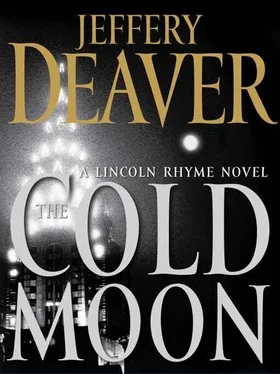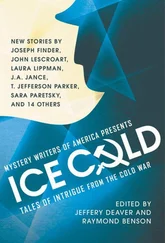"Go on."
"I don't know any details. It's like you're on the street doing your job and somebody says something to a guy you're standing next to and it doesn't quite, you know, register but then you get the idea."
"You remember names?"
"No, no. This was a while ago. Just, there might be some money. I don't know how it got paid. Or how much. Or to who. All's I heard was the person putting it together, they had something to do with Maryland. That's where all the money goes."
"Anywhere specific? Baltimore? The Shore?"
"Nope."
Sachs considered this, wondering what the scenario might've been. Did Creeley or Sarkowski have a house in Maryland, maybe on the water-Ocean City or Rehobeth? Did some of the cops at the One One Eight? Or was it the Baltimore syndicate? That made sense; it explained why they couldn't find any leads to a Manhattan, Brooklyn or Jersey crew.
She asked, "I want to see the Sarkowski file. Can you point me in any direction?"
Snyder hesitated. "I'll make some calls."
"Thanks."
Sachs rose.
"Wait," Snyder said. "Lemme say one thing. I called you a kid. Okay, shouldn't've said that. You got balls, you don't back down, you're smart. Anybody can see that. But you ain't been around long in this business. You gotta understand that what you're thinking about the One One Eight. They're not going to be clipping anybody. And even if something is going down, it's not going to be black-and-white. You gotta ask yourself, What the fuck difference does it make? A few dollars here or there? Sometimes a bad cop saves a baby's life. And sometimes a good cop takes something he shouldn't. That's life on the streets." He gave her a perplexed frown. "I mean, Christ, you of all people oughta know that."
"Me?"
"Well, sure." He looked her up and down. "The Sixteenth Avenue Club."
"I don't know what that is."
"Oh, I'll bet you do."
And he told her all about it.
Dennis Baker was saying to Rhyme, "I hear she's a great shot."
The lab was male only at the moment; Kathryn Dance had returned to the hotel to check in once again and Amelia was out on the Other Case. Pulaski, Cooper and Sellitto were here, along with Jackson the dog.
Rhyme explained about Sachs's pistol club and the competitions she was in. Proudly he told Baker that she was very close to being the top handgun shot in the metro league. She'd be competing soon and was hoping to make the number-one slot.
Baker nodded. "Looks like she's in as good shape as most of the rookies just out of the academy." He patted his belly. "I should be working out more myself."
Ironically, wheelchair-bound Rhyme was himself doing more exercising now than before the accident. He used a powered bicycle-an ergometer-and a computerized treadmill daily. He also did aqua therapy several times a week. This regimen served two purposes. It was intended to keep his muscle mass solid for the day when, as he believed, he would walk again. The exercises were also moving him further toward that goal by improving the nerve function in the damaged parts of his body. In the past few years he'd regained functions that doctors had told him he'd never again have.
But Rhyme sensed that Baker wasn't particularly interested in Sachs's Bowflex routines-a deduction confirmed when the man asked his next question. "I heard that you guys're…going out."
Amelia Sachs was a lantern that attracted many moths and Rhyme wasn't surprised that the detective was checking out the availability of the flame. He laughed at the detective's quaint term. Going out. He said, "You could put it that way."
"Must be tough." Then Baker blinked. "Wait, I didn't mean what you think."
Rhyme, though, had a pretty good idea what the detective was saying. He wasn't referring to a relationship between a crip and somebody who was mobile-Baker seemed hardly to notice Rhyme's condition. No, he was referring to a very different potential conflict. "Two cops, you meant."
The Other Case versus His Case.
Baker nodded. "Dated an FBI agent once. She and I had jurisdictional issues."
Rhyme laughed. "That's a good way to put it. Of course, my ex wasn't a cop and we had a pretty rough time too. Blaine had a great fastball. I lost some nice lamps. And a Bausch amp; Lomb microscope. Probably shouldn't've brought it home… Well, having it at home was okay; I shouldn't've had it on the nightstand in the bedroom."
"I'm not gonna make jokes about microscopes in the bedroom," Sellitto called from across the room.
"Sounds like you just did, if you ask me," Rhyme replied.
Deflecting Baker's small talk, Rhyme wheeled over to Pulaski and Cooper, who were trying to lift prints from the spool from the florist shop, on Rhyme's hope that the Watchmaker couldn't undo the green metallic wire with gloves on and had used his bare hands. But they were having no success.
Rhyme heard the door open and a moment later Sachs walked into the lab, pulled off her leather jacket and tossed it distractedly on a chair. She wasn't smiling. She nodded a greeting to the team and then asked Rhyme, "Any breaks?"
"Nothing yet, no. Some more strikes on the EVL but they didn't play out. No ASTER information either."
Sachs stared at the chart. But it seemed to Rhyme that she was seeing none of the words. Turning to the rookie, she said, "Ron, the detective on the Sarkowski case told me he heard rumors about money going to our One One Eight friends at the St. James. He thinks there's a Maryland connection. We find it, we find the money and probably the names of some people involved. I'm thinking it's a Baltimore OC hook."
"Organized crime?"
"Unless you went to a different academy than me, that's what OC means."
"Sorry."
"Make some calls. Find out if anybody from a Baltimore crew's been operating in New York. And find out if Creeley, Sarkowski or anybody from the One One Eight has a place there or does a lot of business in Maryland."
"I'll stop by the precinct and-"
"No, just call. Make it anonymous."
"Wouldn't it be better to do it in person? I could-"
"The better thing," Sachs said harshly, "is to do what I'm telling you."
"Okay." He raised his hands in surrender.
Sellitto said, "Hey, some of your good humor's rubbing off on the troops, Linc."
Sachs's mouth tightened. Then she relented. "It'll be safer that way, Ron."
It was a Lincoln Rhyme apology, that is to say, not much of one at all, but Pulaski accepted it. "Sure."
She looked away from the whiteboards. "Need to talk to you, Rhyme. Alone." A glance at Baker. "You mind?"
He shook his head. "Not at all. I've got some other cases to check on." He pulled on his coat. "I'll be downtown if you need me."
"So?" Rhyme asked her in a soft voice.
"Upstairs. Alone."
Rhyme nodded. "All right." What was going on here?
Sachs and Rhyme took the tiny elevator to the second floor and he wheeled into the bedroom, Sachs behind him.
Upstairs, she sat down at a computer terminal, began typing furiously.
"What's up?" Rhyme asked.
"Give me a minute." She was scrolling through documents.
Rhyme observed two things about her: Her hand had been digging into her scalp and her thumb was bloody from the wounding. The other was that he believed she'd been crying. Which had happened only two or three times in all the time they'd known each other.
She typed harder, pages rolled past, almost too fast to read.
He was impatient. He was concerned. Finally he had to say firmly, "Tell me, Sachs."
She was staring at the screen, shaking her head. Then turned to him. "My father…he was crooked." Her voice choked.
Rhyme wheeled closer, as her eyes returned to the documents on the screen. They were newspaper stories, he could see.
Her legs bounced with tension. "He was on the take," she whispered.
Читать дальше












